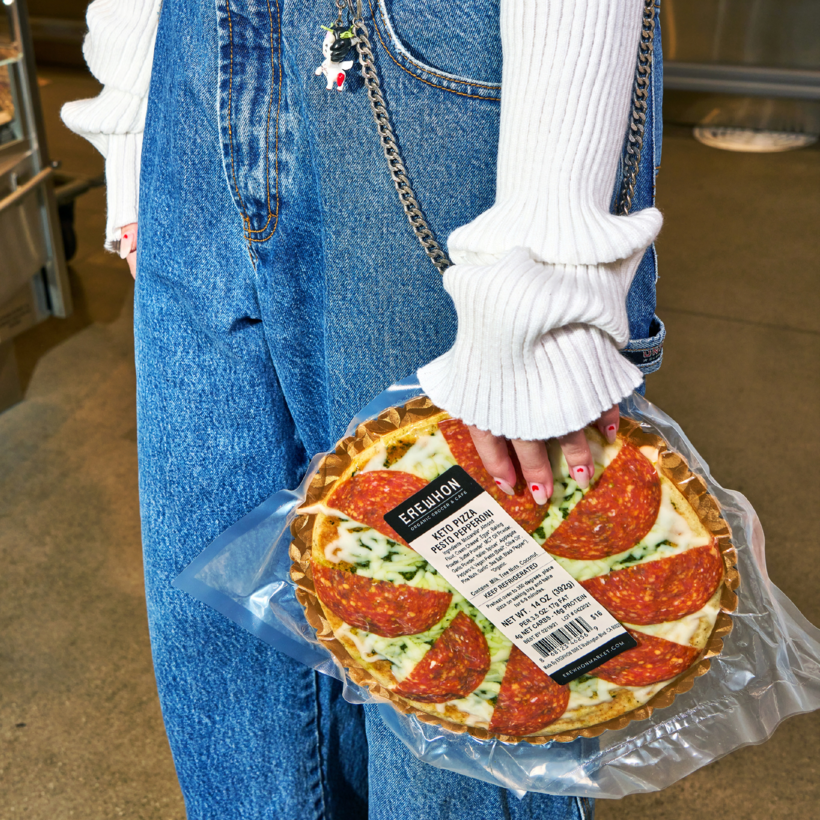When I first moved to L.A., I had a hard time “finding” it. I just drove around in my Volkswagen, looking. Where is everyone? And what are they doing? Am I in L.A. now? How about now? Why doesn’t it feel like it? What I didn’t understand is that L.A. isn’t a place. It’s trying to remember where you parked your car in a series of identical, but different, parking garages. Am I on level M3 or P7 or C16? The answer is yes.
Meanwhile, I couldn’t shake the feeling that, somewhere else, everyone was in L.A., together, doing something really great that I didn’t know about. So I did what was natural. I got suspicious and resentful of all the people I knew. Where were you last night? But actually.
In my quest to figure out where I could go to experience L.A., I remember reading a feature in the Los Angeles Times about the 101 best restaurants here and thinking, “This is it.” As a mild, mid-career professional, I had come to understand that the main way to interact with a culture is by going to an expensive restaurant where they ask you, “Do you know how our menu works?,” when you sit down.
But even though I ate at many of those places, I discovered after living in Los Angeles long enough that the Los Angeles Times list was a lie. Because the most important restaurant in Los Angeles is a small chain of health-food stores called Erewhon. If there were a heat map of the city, Erewhon’s eight outposts—in Hollywood, Santa Monica, Pacific Palisades, Calabasas, Studio City, Beverly Hills, Silver Lake, and Venice—would be at its center, glowing like the heart chakra of the L.A. basin.
An Orgasmic Shopping Experience
But what is Erewhon, really? That’s a good question. There’s no analogue to it. It’s a “grocery store” the way Burning Man is a “place to park your car” or Pearl Harbor was a “Sunday.” It’s a juice bar, a wellness center, a lunch counter for wealthy bohos and Kanye West. (He was a regular at the Calabasas one before he lost his mind and also his house in Calabasas.) It’s to groceries what Tesla’s Model X once was to cars: ostentatiously expensive with a patina of virtue signalling. It’s what Whole Foods fantasizes about being when it looks in the mirror and sucks in its cheeks.
Erewhon is $30 sprouted-almond butter, and $15 raw-food “pizza” slices, and four ounces of Real Scientific Hemp Oil for 130 bucks. It’s organic Swiss chard displayed like a Fabergé egg hatched in a boreal forest, and a cooler case that stages an orgasm of alternative milks.
If you walk in there expecting it to be a health-food store, you’re going to be surprised. Let’s say, for the sake of argument, you were a food co-op, such as the one I went to as a child in Cleveland. A place you could buy bread that broke apart like the ancient remnants of the Ark of the Covenant when you tried to remove it from the bag, and tubes of expressed soy gelatin flavored to taste like someone’s idea of chicken and sold under the name Chickettes. A place you’d go to meet a Communist librarian who doesn’t shave her armpits, or a rollerblading I.R.S. officer who spends weekends in a homemade sweat lodge.
And then say that you, Cleveland Food Co-Op, were in L.A. many years later, and you parked a recumbent bicycle on San Vicente and walked into the Venice branch of Erewhon, wearing your usual Tevas and socks. You’d blink and cast your eyes upon flocks of handsome men in mustaches and $200 sweatpants, and beautiful women in Western hats and jumpsuits, none of whom seem to have anything to do on a weekday afternoon.
It’s what Whole Foods fantasizes about being when it looks in the mirror and sucks in its cheeks.
You’d see Mercedes G-Wagons being valet-parked, and Jennifer Aniston’s hairstylist, and two blond surfers who looked like the brother-and-sister stars of a chilling sequel to Midsommar. And you would think, My God, what hath I wrought, if I am conjugating “hath” the right way? And: Oh, no, I feel I’m underdressed. Where are my high-waisted pants and vibey hat? And: Don’t worry, Erewhon, I won’t tell anyone we’re related, because no one would believe me anyway.
I went in there a few weeks ago and saw the actual Goldie Hawn perusing the fermented-foods section, wearing a canvas jumpsuit and sunglasses, totally barefoot. Goldie Hawn would not go to a food co-op.
What do people come here to buy? O.K. Say you wanted a refrigerated single-serving beverage: You could buy Ubu Hemp tonic, Teakina, Vive Organic Wellness Rescue shots, Mojo My Immunity or My Gut shots, or Raw Turmeric Elixirs. You could buy Re-up shots, Restore shots, Unwind shots, Restore Ginger shots, Restore probiotic shots, Lumen Hemp shots, Vermont Village Apple Cider Vinegar shots, or Farmhouse Culture Gut Shots.
Or you could purchase bottles of Sound Rose tea; Teaonic I Love My Body, I Love My Gut, or I Love My Liver teas; Simply 3 Original Sparkling Apple Cider Vinegar Tonic Raw & Unfiltered with the Mother; Mother Earth Organic Root cider; or Fermenting Fairy Lavender Ginger Lemonade.
As for water, there’s Live Cultures Dairy-Free Live Probiotic, by the Water Kefir People; Bulletproof FATwater; Vital Proteins Collagen; Hydrogen Infused; Tru Alka 9-10 Ph Stable; Alkaline88; Qhre 10ph; Essence Alkaline Hydration; 1907 New Zealand; or forty bazillion other water options.
Wellness: Next to Godliness
And it’s the center of (a certain kind) of Los Angeles culture. The aspirational one. The deranged-former-movie-star-who-gets-transfused-every-day one. Which is crazy, right? That a health-food store is to the Los Angeles of today what Barneys was to the New York of the 2000s? I would say no, it’s not crazy. The prevailing luxury good of the last decade is not fashion or jewelry. It’s wellness—youth, health, beauty, balance, purity in the midst of a fatally soiled world, ad nauseam.

The handbook for the yearnings of the privileged class in America is no longer Vogue, with its images of half-starved women wearing architectural dresses made by hand. When no one was looking, it became Goop—the headquarters of which, by the way, is just a holotropic breath from almost every Erewhon.
The other reason it makes sense is that Erewhon is also the official grocery store of stratification, which feels very now. It was originally opened in the 60s, during the first wave of modern American health food, but it was purchased and relaunched in 2011, by a couple named Tony and Josephine Antoci, with a simple notion: the problem with Whole Foods wasn’t that it was too Whole Foods; it was that it wasn’t Whole Foods enough. Their killer app was: Let’s make it less for everyone and more for some people.
Erewhon is a place where you can spend 200 bucks, fail to fill a single shopping bag, eat everything you bought, and not be close to full. It’s a place where everyone I talked to admonished themselves for spending frivolously, no matter how much money they had. Even billionaires can sometimes feel like assholes for buying a $17 grapefruit.
But I don’t mean just income stratification. I mean cultural stratification. Food is extremely partisan now. Ron DeSantis would never be caught dead eating a Beyond Burger. The people at an Alabama football tailgate would spontaneously combust if they walked in here and saw the 17 bespoke kimchis, and the two dozen sauerkrauts, and the rack of CBD products under lock and key near the register, which are marketed like rare beauty products known only to people who are friends with Natalie Portman.
Have you read that book by Ezra Klein, about how politics has become a super-identity? How it overwhelms all other identities—racial, religious, et cetera? Erewhon is a super-identity.
Even billionaires can sometimes feel like assholes for buying a $17 grapefruit.
Here’s the other way you know it’s the hottest place in L.A.: Everyone secretly hates everyone else at Erewhon. I know because I asked. We’re all walking the aisles full of reflexive resentment. It’s sort of like how you hate everyone you see at the kind of party you feel especially lucky to have been invited to.
The people I interviewed at Erewhon—the middle-aged personal assistant to a wealthy family who purchases all of their foodstuffs here, the real-estate agent who deals in Santa Monica estates, the college grad scolding herself for buying macrobiotic salad when she can’t make rent—they all said most of the people who shop here are poseurs and lemmings who believe in past-life regression and human-biome chiropractors.
It doesn’t matter if those people are essentially no different from you. It’s like, if I met my actual self perusing that truly insane water aisle, I’d think, “What an asshole.” Erewhon is a hate-fuck.
But look, I didn’t find Erewhon because I was in the market for an anthropological case study on the woo-woo hothouse of Los Angeles. I found Erewhon because I wanted a smoothie. And I came back because it’s a hopeful place that has something called Jungle Nuts, which I’m pretty sure will help both me and the Ecuadorean rain forest flourish. I feel healthier and less diseased just buying $12 fermented drinks I can’t finish because they don’t taste drinkable.
One gets the sense, being here, that if you ate everything on display, you’d finally be able to turn into a beam of light and ascend to heaven, where the Dalai Lama would be waiting for you with Tracy Anderson, and you’d all have a cup of hot water with lemon and then Tantrically orgasm until the coming of the next cosmic age. The food actually is healthier. And it’s made by people and not Nabisco. The vegetables are beautiful, the fruit is gorgeous, and everyone is attractive.
Even the elderly people who are here to buy soups to ward off imminent death take on the glow of immortality when illuminated by the recessed lighting over the smoothie bar.
So come on by. Order yourself a Nowhere coffee (organic coffee, Ancient Organics ghee, Vital organic protein, Onnit MCT oil) and enjoy that most L.A. of pastimes: concentrating so much on self-betterment that you forget there are people who have real problems.
Devin Friedman eats coconut yogurt and low-sugar fermented foods, so he is probably going to live forever




